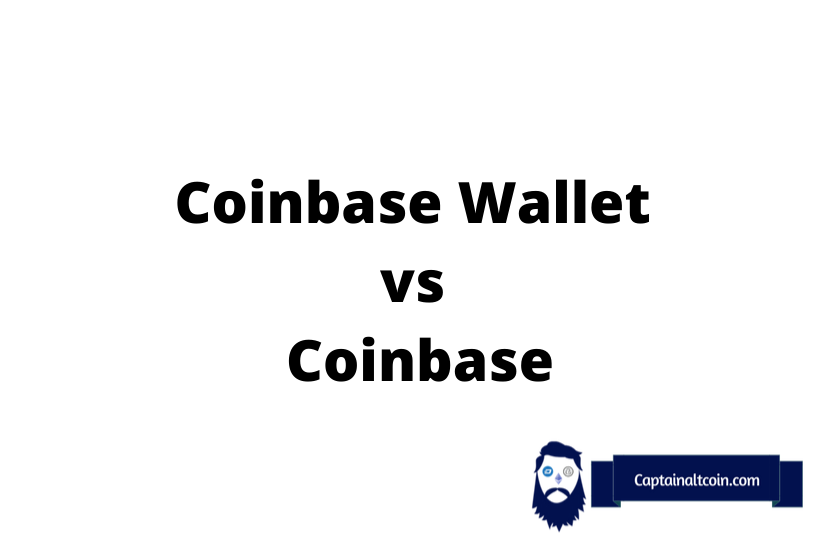
What you'll learn 👉
Coinbase wallet vs Coinbase
530 cryptocurrencies exchanges currently exist in the world, and according to CoinGecko, Coinbase is the No.2 exchange. More than 10B $ in daily trading volume, over 120 coins, and 70M verified users to make this US-based exchange one of the largest there is. And there is Coinbase Wallet.
You can use Coinbase exchange and Coinbase Wallet to buy, sell, trade, and store crypto. And then what’s the difference between them if they can both do that? Let’s go through this article together and see what it is that sets them apart.
What is Coinbase

Based in San Francisco, US, this crypto exchange has been in the crypto business since 2012. Coinbase is one of the oldest crypto trading platforms around. You could trade only Bitcoin in the start, but they added more currencies over time, and now you have over 120 different cryptos at your disposal.
Over 100 countries in which Coinbase is supported, dozens of payment methods, low fees, as well as a vast number of satisfied users put this exchange in the top 3 exchanges in the world.
You can read a full review of Coinbase by clicking here.
Fun fact: In 2013, Coinbase asked Ethereum founder Vitalik Buterin to come in for a chat. They nearly offered Buterin a job. Still, Buterin didn’t accept the offer because early the following year, he went on to create, now widely known, Ethereum.
What is Coinbase Wallet
Coinbase Wallet, as the name itself implies, is a crypto wallet and Decentralized app browser controlled only by you. Private keys for your wallet are located directly on your mobile phone (there is no “middleman” between you and your crypto, like in the case when you store your crypto assets on some centralized exchange like Coinbase, Binance, etc.).
With this wallet, you have direct and total control over your own digital assets. We can say without a doubt that Coinbase Wallet is one of the most secured and best self-custody crypto wallets that we can find in today’s market.
If you want to find a wallet that gives you complete control over your digital assets, read our guide on Best Cryptocurrency Wallets.
Difference Between Coinbase And Coinbase Wallet
Coinbase is a centralized crypto exchange, while Coinbase Wallet is a non-custodial crypto wallet. Both are available on the Chrome browser and Android and iOS devices.
Let’s go deeper into the topic and see their key differences.
Note: you don’t need to have an account on Coinbase in order to use the Coinbase Wallet.
Coinbase vs. Coinbase Wallet: Primary Features
| Primary Features | |
| Coinbase | Coinbase Wallet |
| Top security | Top security |
| Beginner-friendly user interface | Beginner-friendly user interface |
| Easy to use | Easy to use |
| Displays portfolio balance and performance | Stores keys in the device |
| Crypto-to-crypto transactions, advanced charts, and many other features | Provides access to DApps |
| Support over 120 cryptos | Support for 4,000+ digital assets and a bunch of Dapps |
Coinbase vs. Coinbase Wallet: Supported Currency
Both of them have a considerable number of currencies that they support. Up to the present time, Coinbase offers its users over 120 cryptos. On the other hand, Coinbase Wallet supports all ERC-20 tokens, BTC, XRP, XLM, BCH, LTC, DOGE, and other popular cryptos.
Coinbase vs. Coinbase Wallet: Fees
Fees apply to both the Coinbase Wallet and Coinbase.
| Fees | Coinbase |
| Bank account | 1.49% |
| Debit/credit cards | 2% |
| Purchases | 0% to 0.50% |
| Trades | 0.50 USD |
| ACH transfer | Free |
| Wire transfer | 10 USD deposit, 25 USD withdrawal |
| Crypto conversion | 0.50% to 2% |
| Coinbase fee | 0.99 to 2.99 USD based on the amount |
The Coinbase Wallet fees are similar. Depending on the payment method, location, and order mode, fees range from 1.49 – 3.9%.
Coinbase vs. Coinbase Wallet: Security
Security is maybe the most important thing that you should look for in any exchange or wallet. Both Coinbase and Coinbase Wallet provide reliable security for their users.
| Key security features | |
| Coinbase | Coinbase Wallet |
| 2-step verification | Biometric authentication |
| Insurance on your crypto assets | Cloud backup |
| Cold storage (98%) | Public and private keys are stored in the device (not on the server) |
| Biometric login | Vendor insurance policy |
Coinbase vs. Coinbase Wallet: Insurance
Cryptos are not legal tender (except Bitcoin in El Salvador), and because of that, they are not backed by any government in the world. Considering that, digital currencies are not subject to SIPC (Securities Investor Protection Corporation) or FDIC (Federal Deposit Insurance Corporation) protections.
Even though they are not insured by the SIPC, Coinbase has crime insurance that protects your digital assets from cybersecurity breaches and theft. Keep in mind that their policy doesn’t include any losses occurring from unauthorized access to your account as a consequence of a loss of your login credentials.
Rest assured because Coinbase will give its best to make you whole in case of an unexpected security event.
On the other side, Coinbase Wallet covers your digital assets via a vendor insurance policy. If your funds are lost as a result of a security breach, the service provider is obliged to make it up to you.
The Bottom Line
Being one of the most prominent names in the crypto sphere, Coinbase, as well as Coinbase Wallet, provides A class security, a very pleasant user-friendly interface, and supports many digital assets. They are suited for both beginners and professional users.
Coinbase is the best choice for you if you want to buy, sell and trade cryptos. But if you need a safe place to store your crypto assets, then the Coinbase Wallet is the right choice for you.
Note: buying, selling, and trading crypto are cheaper and easier at the exchange, and we recommend that you use the exchange for that. But if we consider the security of the storage of your funds, then the wallet should always be the first choice.
Remember – not your keys, not your Bitcoin (coins).
1. Are Coinbase and Coinbase Wallet the same?
They are not the same. The names are similar, the characteristics are similar, but the basic functions of these two products are different.
Coinbase is a centralized crypto exchange that makes buying, selling, and trading your digital assets an easy job.
Coinbase Wallet is a non-custodial crypto wallet that you can use to store your digital assets, other collectibles, browse DApps, and more, and at the same time, you have complete control over them.
2. What coins are supported by Coinbase Wallet?
Coinbase Wallet supports BTC, BCH, XRP, XLM, LTC, DOGE, as well as all ERC-20 tokens (USDC and DAI included), and a whole world of DApps.
3. Is Coinbase safe?
The short answer is YES. Coinbase has invested massively in insuring its vaults in order to minimize their losses.
Coinbase also complies with the following regulatory bodies, laws, and regulations:
- with state money transmission laws and regulations,
- with the USA Patriot Act,
- with the Bank Secrecy Act, and
- it is registered with FinCEN as an MSB (Money Services Business).
4. Is Coinbase Wallet trustworthy?
We think the answer is quite clear. A company like Coinbase, with millions of satisfied customers, with a massive daily trading volume, simply cannot give away a bad product. We assume that based on what has been said so far, you also think that the answer is YES.
FAQs
Make sure to check comparisons between some of the major exchanges:








Do I need to have crypto in my wallet to receive crypto or NFTs?
No, if someone else sends it to you. If you want to send it out of your wallet, then you need to have ETH (if the NFT is on the ETH blockchain) to pay for gas.